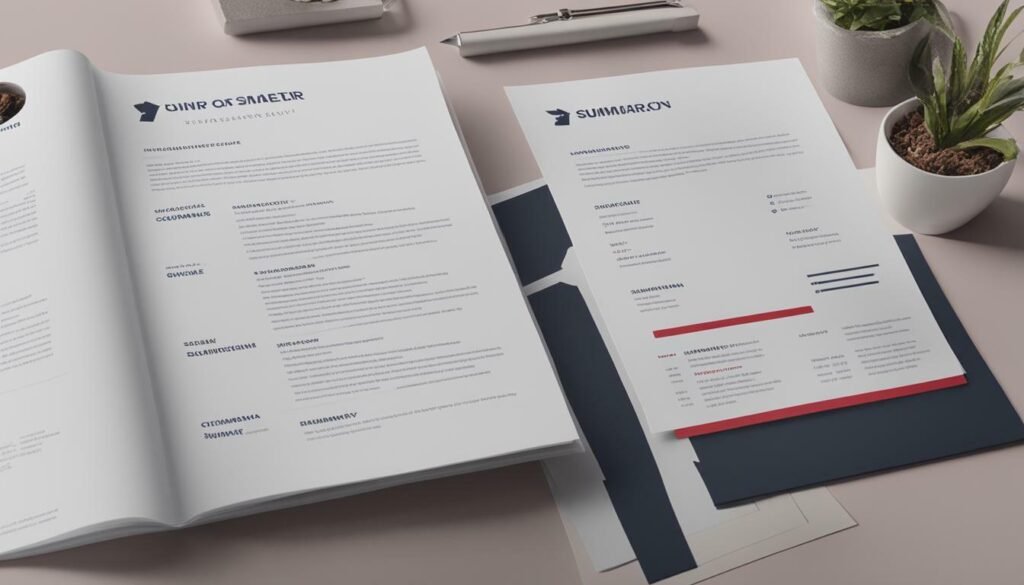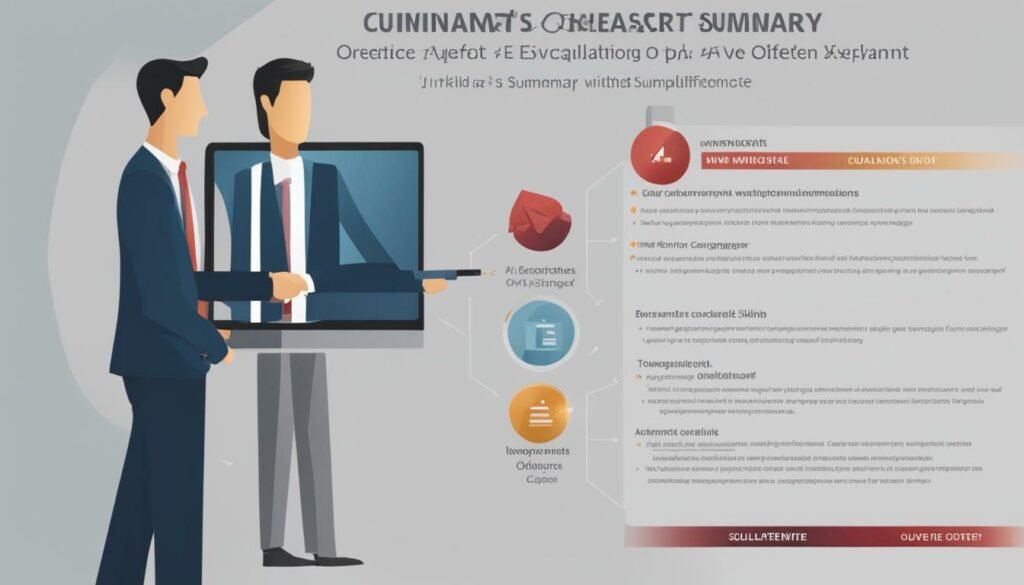If you’ve been wondering, “Do I need to put a summary on my resume?” you’re not alone. Many job seekers are uncertain about the significance of including a summary statement. Some argue that it can be a powerful branding tool, while others believe it takes up valuable space.
When deciding whether to include a summary statement, it’s important to consider its potential impact on your job search strategy. A well-crafted summary can help hiring managers quickly understand your value and set you apart from other candidates. It should highlight your key skills, accomplishments, and the value you can bring to the role.
However, if you choose to include a summary, it should be customized for each specific job application and not simply duplicate information already on your resume. It should serve as a concise snapshot of your qualifications and make a strong case for why you are the right fit for the position.
- Including a summary on your resume can be a powerful branding tool.
- Your summary should be tailored to each specific job application.
- Highlight your key skills, accomplishments, and value you can bring to the role.
- Consider including a Career Highlights section as an alternative to a traditional summary.
- Ultimately, the decision to include a summary depends on your unique circumstances and goals.
Benefits of Including a Summary on Resume
Including a summary on your resume can provide numerous benefits and give you a competitive edge in the job market. A well-crafted summary statement can catch the attention of hiring managers and make them want to learn more about you as a candidate. It serves as a concise pitch that highlights your key qualifications and demonstrates the value you can bring to the role. By summarizing your skills, accomplishments, and qualifications upfront, you make it easier for recruiters to quickly assess your fit for the position.
A resume summary also allows you to tailor your application to the specific job you’re applying for. You can emphasize the relevant experiences, skills, and achievements that directly align with the requirements of the role. This targeted approach helps you stand out from other applicants and shows that you’ve taken the time to understand the needs of the company. With a well-crafted summary, you can make a strong first impression and increase your chances of landing an interview.
Additionally, a summary statement can effectively communicate your personal brand. It gives you the opportunity to showcase your unique strengths and demonstrate why you’re the best candidate for the job. By highlighting your most notable achievements and skills, you can position yourself as a valuable asset to potential employers. A strong summary can leave a lasting impression and make you more memorable among a sea of other applicants.

| Benefits of Including a Summary on Resume |
|---|
| Helps hiring managers quickly understand your value. |
| Highlights your key skills and accomplishments. |
| Demonstrates the value you can bring to the role. |
| Allows for customization based on specific job applications. |
| Creates a memorable personal brand. |
How to Write a Resume Summary
Writing a compelling resume summary requires careful thought and attention to detail. It is an opportunity for you to showcase your skills, experiences, and qualifications in a concise and impactful manner. Here are some tips and best practices to help you craft an effective resume summary:
- Keep it concise: A resume summary should be brief, typically consisting of 2-3 sentences. Focus on highlighting your most relevant qualifications and accomplishments.
- Tailor it to the job: Customize your resume summary for each job application. Consider the specific requirements and keywords mentioned in the job description and align your summary accordingly.
- Highlight your key skills: Identify the key skills and attributes that make you a strong candidate for the position. Emphasize these skills in your summary to grab the attention of hiring managers.
- Showcase your accomplishments: Use your resume summary to highlight your notable achievements and contributions in previous roles. Quantify your accomplishments whenever possible to provide concrete evidence of your capabilities.
Remember, your resume summary should serve as a snapshot of your qualifications and entice hiring managers to read further. It should be concise, tailored, and compelling, giving a glimpse of the value you can bring to the role.

“Results-driven marketing professional with 5+ years of experience in developing and implementing successful digital marketing campaigns. Proven track record of driving brand awareness, increasing website traffic, and generating leads. Skilled in social media management, content creation, and data analysis. Passionate about creating innovative strategies to deliver measurable business results.”
Use this example as inspiration to create your own unique and compelling resume summary. Tailor it to your specific skills and experiences, and make sure it aligns with the requirements of the job you are applying for.
Next Steps
Now that you have a better understanding of how to write a resume summary, take some time to reflect on your own qualifications and experiences. Consider the key skills and achievements that make you stand out as a candidate. Then, use this information to craft a concise and impactful resume summary that will grab the attention of hiring managers.
Resume Summary vs Objective: Which Should You Choose?
When deciding whether to include a summary or objective on your resume, it’s important to understand the differences between the two. A resume summary is a concise overview of your qualifications, experience, and skills, tailored to the specific job you’re applying for. It highlights your key accomplishments and showcases the value you can bring to the role. On the other hand, a resume objective is a statement that focuses on your career goals and aspirations, indicating what you hope to achieve in a particular position.
While both options have their merits, the resume summary tends to be more effective in capturing the attention of hiring managers. It provides a quick snapshot of your qualifications and immediately demonstrates your suitability for the job. By highlighting your relevant skills and accomplishments, it shows that you have the experience and expertise to excel in the role. An objective statement, on the other hand, can come across as generic and self-serving, lacking the specificity needed to stand out in a competitive job market.
Here’s an example to illustrate the difference:
Resume Objective: To obtain a position in a dynamic organization where I can utilize my skills and contribute to its success.
Resume Summary: Results-oriented marketing professional with 5 years of experience in digital marketing. Demonstrated track record of driving brand awareness and increasing customer engagement through strategic social media campaigns. Strong analytical skills and proficiency in data-driven decision making. Passionate about leveraging digital platforms to enhance brand visibility and drive business growth.
As shown in the example, the resume summary provides specific details about the candidate’s experience and achievements, making a compelling case for their suitability for a marketing role. It grabs the reader’s attention and immediately showcases their value as a candidate.
In conclusion, when deciding between a resume summary and objective, it’s generally recommended to go with a summary statement. However, it’s essential to tailor the summary to each job application and ensure it effectively communicates your qualifications and the value you can bring to the role. Remember, your resume is your opportunity to make a strong first impression, so make sure to put your best foot forward.
| Resume Summary | Resume Objective |
|---|---|
| Highlights specific qualifications and achievements | Focuses on career goals and aspirations |
| Tailored to each job application | Often generic and lacks specificity |
| Grabs the attention of hiring managers | May not stand out in a competitive job market |

Crafting a compelling resume summary requires a strategic approach and attention to detail. While it may seem like a small section of your resume, it can have a big impact on how hiring managers perceive your qualifications. Here are some tips to help you create a resume summary that stands out:
- Be concise: Keep your summary brief and to the point. Aim for a paragraph of 3-4 lines that succinctly highlights your key skills and accomplishments.
- Use strong language: Make your summary impactful by using strong verbs and action-oriented language. This will help to emphasize your achievements and demonstrate your motivation and drive.
- Highlight relevant achievements: Focus on the accomplishments that are most relevant to the job you’re applying for. Tailor your summary to highlight your skills and experiences that align with the requirements of the position.
- Showcase your unique value proposition: Use your summary to showcase what sets you apart from other candidates. Highlight any unique skills, certifications, or experiences that make you stand out in the industry.
Remember, your resume summary should entice hiring managers to read further and consider you for the position. By following these tips, you can craft a compelling summary that effectively communicates your value and increases your chances of landing an interview.
Table 1: Resume Summary Example
| Summary | Analysis |
|---|---|
| Results-driven marketing professional with 5+ years of experience in developing and implementing successful digital marketing campaigns. Proven track record of driving brand awareness and increasing customer engagement. Skilled in utilizing data-driven insights to optimize marketing strategies and deliver measurable results. | This summary effectively highlights the candidate’s experience and skills in digital marketing. It emphasizes their track record of achieving results and their ability to leverage data for strategic decision-making. |
“Crafting a compelling resume summary requires a strategic approach and attention to detail.”
By following these tips and tailoring your summary to each job application, you can create a resume that makes a strong impression on hiring managers. Remember to keep it concise, use strong language, highlight relevant achievements, and showcase your unique value proposition. This will help you stand out from the competition and increase your chances of landing your desired job.

The Alternative: Career Highlights Section
If you’re not sold on including a summary statement, an alternative option to consider is the Career Highlights section. This section allows you to showcase your key achievements and align your experience with the target role, providing a clear snapshot of your capabilities. Unlike a traditional summary statement, a Career Highlights section uses bullet points to highlight specific accomplishments, making it easier for hiring managers to quickly assess your qualifications.
When crafting your Career Highlights section, it’s important to be strategic in your selection of achievements. Choose accomplishments that are relevant to the job you’re applying for and demonstrate your skills and expertise. Focus on measurable results and use strong action verbs to convey your impact. For example:
- Increased sales revenue by 20% through implementation of targeted marketing strategies
- Developed and launched a new product line that generated $1 million in revenue within the first year
- Led a cross-functional team of 15 members to successfully complete a complex project ahead of schedule
By highlighting specific achievements in this section, you can immediately capture the attention of hiring managers and differentiate yourself from other candidates. Remember to tailor your Career Highlights section to each job application, focusing on the accomplishments that are most relevant to the position. This will further enhance your chances of standing out and securing an interview.

By considering the Career Highlights section as an alternative to a traditional summary statement, you have the opportunity to showcase your key achievements in a concise and impactful way. This section allows you to grab the attention of hiring managers and demonstrate your value as a candidate. Whether you choose to include a summary statement or opt for the Career Highlights section, make sure it aligns with your specific goals and effectively communicates your qualifications.
Tailoring Your Summary for Each Job Application
Taking the time to tailor your resume summary for each job application can significantly increase your chances of standing out as a qualified candidate. By customizing your summary to align with the specific needs of the company and position, you can demonstrate your understanding of the role and showcase how your skills and experience make you a valuable asset.
One effective strategy is to research the company thoroughly before crafting your summary. Look for key attributes and qualities that the company values, such as specific technical skills or a strong focus on customer service. Incorporate these keywords and phrases into your summary to show that you possess the qualities they are seeking.
In addition to focusing on the company’s needs, be sure to highlight your own unique qualifications. Emphasize relevant achievements and experiences that are most relevant to the position. Use strong language to convey your accomplishments and the impact you have made in previous roles. This will help you grab the hiring manager’s attention and make a memorable impression.
| Summary Tips: |
|---|
| Customize your summary for each job application |
| Research the company to understand their needs |
| Highlight relevant achievements and experiences |
| Use strong language to convey impact |
Example:
“As a skilled project manager with a proven track record of successfully delivering complex initiatives on time and within budget, I am confident that I can effectively lead your team to achieve its goals. With my extensive experience in stakeholder management, risk assessment, and strategic planning, I am prepared to tackle any challenge that comes my way. I thrive in fast-paced environments and am known for my ability to collaborate cross-functionally to drive results. Let’s connect and discuss how I can contribute to the continued success of your organization.”
Remember, the goal of tailoring your resume summary is to make a strong and relevant impression. By customizing it to the specific job application, you can demonstrate your understanding of the company’s needs and position yourself as the ideal candidate. Use the tips and strategies outlined above to craft a compelling resume summary that will catch the hiring manager’s attention and increase your chances of securing an interview.

Deciding whether to include a summary on your resume ultimately depends on your individual situation and what you believe will best showcase your qualifications. When it comes to putting a summary on your resume, opinions are divided. Some believe that a summary statement can be a powerful branding tool that helps hiring managers quickly understand your value, while others argue that it takes up valuable space and that the resume should stand on its own.
If you do decide to include a summary statement, it is important to remember that it should not simply regurgitate information already on your resume. Instead, it should be tailored to each specific job application and highlight your key skills, accomplishments, and the value you can bring to the role. This will demonstrate to the hiring manager that you have taken the time to understand their needs and have positioned yourself as the ideal candidate.
Alternatively, you can consider including a Career Highlights section with bullet points that outline your key achievements and demonstrate how your experience aligns with the target role. This approach can provide a concise and visually appealing snapshot of your qualifications. It allows the hiring manager to quickly identify your standout accomplishments and understand the value you can bring to their organization.
Ultimately, the decision of whether or not to include a summary statement on your resume rests with you. Consider your specific situation, the requirements of the job you are applying for, and your personal branding strategy. Choose the option that you believe will best capture the attention of the hiring manager and effectively communicate your qualifications.

Conclusion
In conclusion, including a well-crafted summary on your resume can be a powerful tool in capturing the attention of hiring managers, but it ultimately depends on your specific circumstances and preferences.
When it comes to putting a summary on your resume, opinions are divided. Some believe that a summary statement can be a powerful branding tool that helps hiring managers quickly understand your value, while others argue that it takes up valuable space and that the resume should stand on its own.
If you do decide to include a summary statement, it should be tailored to each specific job application and should not simply regurgitate information already on your resume. It should highlight your key skills, accomplishments, and the value you can bring to the role.
Alternatively, you can consider including a Career Highlights section with bullet points that outline your key achievements and demonstrate how your experience aligns with the target role. Ultimately, it depends on your specific situation and what you believe will best showcase your qualifications.
FAQ
Do I Need to Put a Summary on My Resume? Find Out Here.
When it comes to putting a summary on your resume, opinions are divided. Some believe that a summary statement can be a powerful branding tool that helps hiring managers quickly understand your value, while others argue that it takes up valuable space and that the resume should stand on its own. Ultimately, it depends on your specific situation and what you believe will best showcase your qualifications.
What are the Benefits of Including a Summary on Resume?
Including a summary on your resume can help you stand out to hiring managers and effectively communicate your value as a candidate. It provides a concise overview of your key skills, accomplishments, and the value you can bring to the role. A well-written summary can grab attention and make a strong first impression.
How Do I Write a Resume Summary?
When writing a resume summary, it is important to tailor it to each specific job application. Highlight your key skills, accomplishments, and the value you can bring to the role. Avoid regurgitating information already on your resume and focus on showcasing your unique qualifications and experiences.
Should I Choose a Resume Summary or Objective?
The choice between a resume summary and objective depends on your specific needs. A resume summary is more appropriate if you have relevant experience and accomplishments to highlight, while an objective is useful if you are just starting your career or changing industries. Consider your goals and what will best showcase your qualifications.
What are Some Tips for Crafting a Compelling Resume Summary?
To create a compelling resume summary, use strong language to emphasize your achievements and skills. Focus on relevant accomplishments and showcase your unique value proposition. Keep it concise and tailored to the job application, highlighting what makes you a strong fit for the role.
What is the Alternative to a Resume Summary?
An alternative to the traditional resume summary is the Career Highlights section. This section uses bullet points to outline your key achievements and demonstrate how your experience aligns with the target role. It provides a concise overview of your accomplishments and can help grab the attention of hiring managers.
How Do I Tailor My Summary for Each Job Application?
It is important to customize your resume summary for each job application. Research the company and position to understand their specific needs and requirements. Tailor your summary to highlight the skills and experiences that align with what the employer is looking for, showcasing your fit for the role.
How Do I Make the Decision Whether to Include a Summary or Not?
The decision to include a summary statement on your resume should be based on your specific circumstances and goals. Consider the job market, your experience, and the role you are applying for. Reflect on the benefits and limitations of a summary statement and determine what will best showcase your qualifications.
Is a Resume Summary Still Relevant in 2023?
In 2023, the importance of a summary on resume insights remains relevant. Recruiters appreciate a concise overview of a candidate’s skills and experience. A well-crafted summary can grab the attention of employers and make a candidate stand out. It serves as a quick snapshot of a candidate’s qualifications, making it a valuable asset in the job application process.
